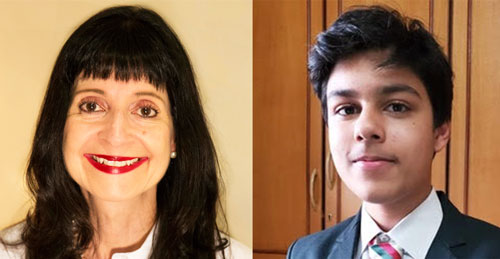اس مہینے, ناظرین اسکرین کرسکتے ہیں نیٹ زیرو کیرن وانگ کے ساتھ بات کرتا ہے۔ سیارے کلاس روم نیٹ ورک پر. This film is curated for the Planet Classroom Network by the Protect Our Planet Movement and Planet Classroom.
Karen Wang, CEO of Climind, believes that technology and innovation can be harnessed to combat climate change. Her company uses artificial intelligence and machine learning to assist corporations and governments in reducing their carbon footprint. ویدانت اس طرح بال, a student and climate activist at Indus International School, is studying the human contribution to climate change as part of a Carbon Footprint Reduction initiative. حال ہی میں, Vedaant interviewed Wang for the Net Zero series to understand how Climind helps researchers and businesses use climate data to make informed decisions and lower emissions in the fight against climate change.
تعلیم کے لئے گلوبل تلاش is pleased to welcome ویدانت اس طرح بال.
Vedaant, why did you select Hanyuan Wang to interview? What inspired you about Climind?
In a corporate world threatened by global climate change, growth and sustainability are rarely able to cooperate. Hanyuan Wang is one of the few that is able to make them function together. Perhaps her work that best displays this is that done in voluntary carbon markets. As companies attempt to meet a changing status quo of net zero carbon emissions, many pay other private bodies that are removing emissions from the environment in order to cancel their own emissions. This incentivizes the reduction of emissions and the increase of absorption of greenhouse gases from the atmosphere. It also results in a higher level of circulation of capital within national economies, creating more productive societies globally. Hanyuan Wang’s ability to make systems function and thrive while satisfying all parties involved is an example to follow in the space of climate change, if we are to aim for long-term sustainability with growth.
آپ کے انٹرویو کے بارے میں آپ کو کس چیز نے سب سے زیادہ حیران کیا۔?
Companies can be persuaded to pursue goals in line with environmental ethicality. Climate reform has largely taken place in the form of regulatory action, which is primarily effective when the issue affects the momentary interests of a nation. تاہم, laws are arguably less strictly made and enforced when it affects the future interests of the entire world. There is one kind of reform, تاہم, which will always motivate any company, and that is a social kind of power. In an information era, consumers have the ability to evaluate their purchasing choices and the effects of the same on the environment; on a large scale this results in large shifts of capital flows in economies. Through this power, consumers have either the power to incentivize climate reform, or risk being apathetic and eventually helpless to their own fate. Those that have the most power in shifting the tectonic plates of society, پھر, seem to just be ordinary Joes.
کیا ہیں 3 main takeaways for the Net Zero audience from your interview with Karen?
سب سے پہلے, emissions can be limited or prevented through government and social actions. دوسرا, the current government and social bodies that exist are a powerful tool for management of policy. آخر, it is more effective to reward positive actions than punish the negative ones: rewards create goals to meet, and punishments create lines to be crossed.
Thank you Vedaant!
C.M. Rubin and Vedaant Thuse Bal
Don’t miss نیٹ زیرو کیرن وانگ کے ساتھ بات کرتا ہے۔, now streaming on the Planet Classroom Network. This film is curated for the Planet Classroom Network by the Protect Our Planet Movement and Planet Classroom.







حالیہ تبصرے